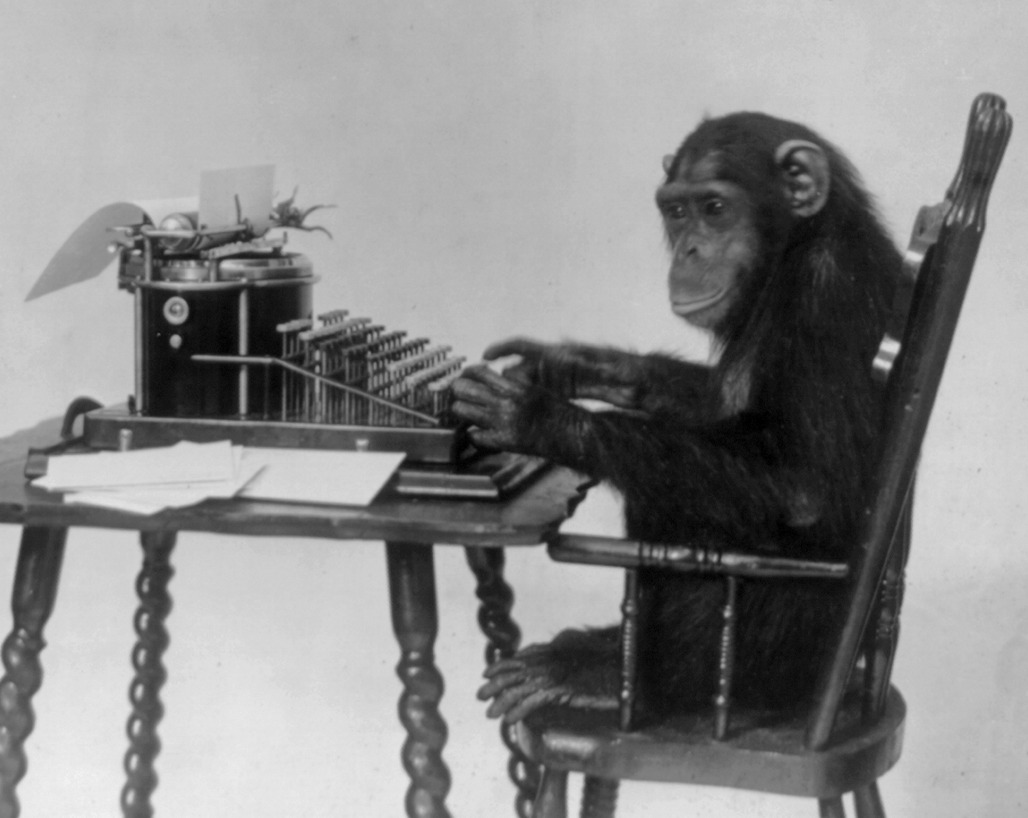
Stick a monkey on a typewriter, let him hit keys all day, and what will you get? Gibberish, probably. But what if you’re prepared to wait longer than a day? Much longer than a day. Infinitely long, say. In that case, the monkey will produce the complete works of Shakespeare. And indeed any and every other work of literature that’s ever been written.
This is from Wikipedia:
The infinite monkey theorem states that a monkey hitting keys at random on a typewriter keyboard for an infinite amount of time will almost surely type any given text, such as the complete works of William Shakespeare.
Infinity is a tricky but important concept in mathematics generally. We saw the appearance of infinity in a recent post, where we looked at the infinite sequence of numbers
1, 1/2, 1/4, 1/8,….
and asked what their sum would be. And it turned out to be 2. In practice, you can never really add infinitely many numbers, but you can add more and more terms in the sequence, and the more you add the closer you will get to 2. Moreover, you can get as close to 2 as you like by adding sufficiently many terms in the sequence. It’s in this sense that the sum of the infinite sequence is 2.
In Statistics the concept of infinity and infinite sums is equally important, as we’ll discuss in a future post. But meantime… the infinite monkey theorem. What this basically says is that if something can happen in an experiment, and you repeat that experiment often enough, then eventually it will happen.
Sort of. There’s still a possibility that it won’t – the monkey could, by chance, just keep hitting the letter ‘a’ totally at random forever, for example – but that possibility has zero probability. That’s the ‘almost surely’ bit in the Wikipedia definition. On the other hand, with probability 1 – which is to say complete certainty – the monkey will eventually produce the complete works of Shakespeare.
Let’s look at the calculations, which are very similar to those in another recent post.
There are roughly 50 keys on a keyboard, so assuming the monkey is just hitting keys at random, the probability that the first key stroke matches the first letter of Shakespeare’s works is 1/50. Similarly, the probability the second letter matches is also 1/50. So to get the first two matching it’s
1/50 \times 1/50
Our monkey keeps hitting keys and at each new key stroke, the probability that the match-up continues is multiplied by 1/50. This probability gets small very, very quickly. But it never gets to zero.
Now, if the monkey has to hit N keys to have produced a text as long as the works of Shakespeare, by this argument he’ll get a perfect match with probability
p=(1/50)^N
This will be a phenomenally small number. Virtually zero. But, crucially, not zero. Because if our tireless monkey repeats that exercise a large number of times, let’s say M times, then the probability he’ll produces Shakespeare’s works at least once is
Q = 1-(1-p)^M
And since p is bigger than zero – albeit only slightly bigger than zero – then Q gets bigger with N. And just as the sum of the numbers 1, 1/2, 1/4, … gets closer and closer to 2 as the number of terms increases, so Q can be made as close to 1 as we like by choosing M large enough.
Loosely speaking, when M is infinity, the probability is 1. And even more loosely: given an infinite amount of time our monkey is bound to produce the complete works of Shakespeare.
Obviously, both the monkey and the works of Shakespeare are just metaphors, and the idea has been expressed in many different forms in popular culture. Here’s Eminem’s take on it, for example:
